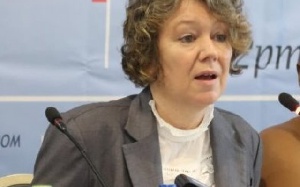The Danish Ambassador to Ghana, Tove Degnbol, has indicated that it is possible for government to achieve a ‘Ghana Beyond Aid’ but it will come at a cost.
Asked if ‘Ghana Beyond Aid’ is attainable during an interview with Dr Etse Sikanku on Class 91.3FM’s World Affairs programme, Ms Degnbol answered in the affirmative stating: “I do think so but I think that it may come at a cost”.
She added that for government to achieve a 'Ghana beyond aid' there must be "much increased taxation” in order to generate domestic revenue to embark on all the developmental projects to improve on living conditions and the economy.
She said it was important that "property tax is collected from those who can afford it, they are paying virtually nothing now and there is huge potential".
She wants an improved tax collection system by customs at the ports and harbours as well as improved and efficient collection of royalties from mining companies as well as a general broadening of the country's tax base.
She said she was concerned about “the people who are not able to engage so much in business cooperation and I’m worried about whether the government will have the funds to ensure the basic social services especially one can worry about the people in the Northern part of Ghana, it is obvious, you can see that when you travel to Bolgatanga and others, the conditions for living are much more difficult there”.
She said it will be government’s obligation to ensure basic services to such areas even beyond aid.
She said Denmark was strengthening its drive with Ghana to also move from aid to trade by increasing more investments and trade cooperation “to help Ghana go beyond aid”.
She said there have been engagements between the current and previous government about their role.
According to her, it has been part of their overall considerations of supporting countries that are most in need explaining “when Ghana was much poorer it was natural for us to build an extensive development cooperation programme here [but] now we think that money could probably be better spent in Burkina Faso, Mali, Ethiopia, Somalia and countries which are really in need”.
She applauded Ghana for changing conditions which she said were positive as a result of economic development “and priority given to the private sector by various governments including the current government where it is much more feasible now for our companies to come in and under commercial basis establish collaborations here in Ghana but was difficult in the past.”
General News of Friday, 20 April 2018
Source: classfmonline.com

















